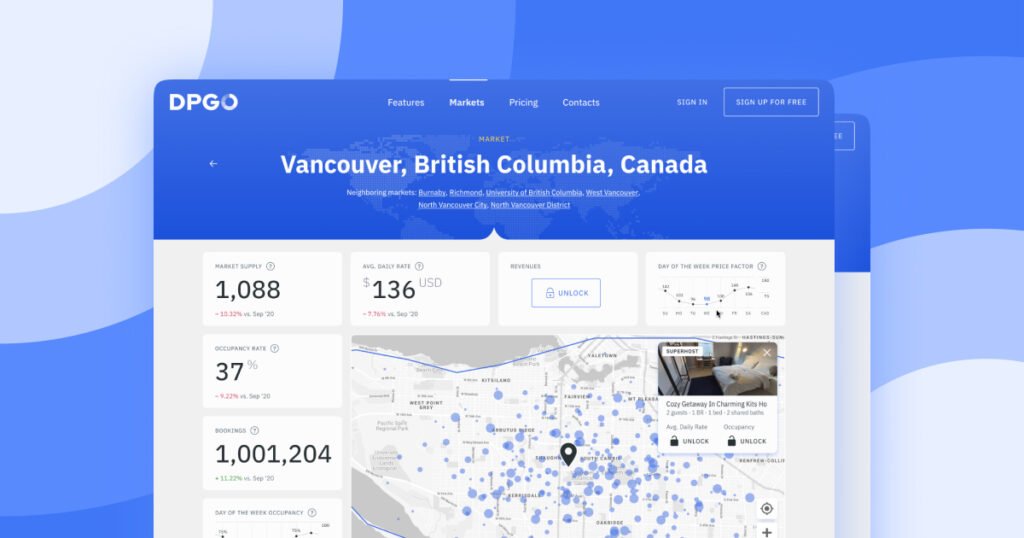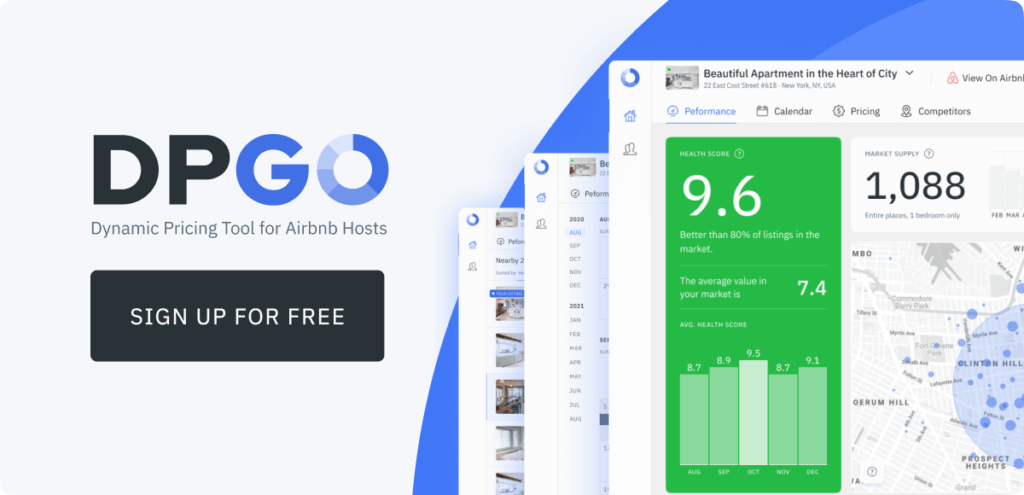Thousands of hosts all over the world use rental arbitrage or Airbnb sublet as a way to make money and grow their business. A rental arbitrage business is a great way to break into the industry without needing to purchase a rental property. Instead, rental arbitrators explore the rental market and target prime tourist destinations. They then rent properties for the purpose of short-term rental arbitrage.
You don’t need a hospitality license in the short-term rental industry and even if you don’t own a property, you can still make use of a property management company should you wish to do so. Just double-check that you are not in contravention of any rental laws and be sure to manage the rental costs of your arbitrage rental property. Rental arbitrage is a form of passive income, but it any property will still require property management.
In this post, we’re going to break down the principle of rental arbitrage and advise you on how you can use it to your benefit. We’ll also touch on the pitfalls of the rental arbitrage process and how to avoid them!
Let’s start off easy…
What is Rental Arbitrage?
Rental arbitrage is the process in which an individual takes out a long-term rental contract on a property, and then lists said property on a short-term rental site like Airbnb or Vrbo with the aim of making a profit. This means that you’re using short-term rentals to pay your long-term lease and then keeping the difference.
In an Airbnb rental arbitrage scenario, the rental arbitrator can either rent a furnished property or rent an unfurnished one and furnish it themselves. Owners of furnished property rentals may be slightly less inclined to accept rental arbitrage offers because it could result in damage to their furniture.
Who Benefits from Airbnb Rental Arbitrage?
Financially speaking, it’s hard to say who benefits more from Airbnb rental arbitrage scenario. In one sense, the financial benefits are more likely to go to the rental arbitrator, but so too do all of the risks.
Some property owners are not in a position to offer their properties as short-term rentals either due to time constraints or financial concerns. Whether it be due to age, health, existing jobs, or stress levels, not everyone has the tools needed to conduct a short-term rental business. This is where rental arbitrage comes in handy. It allows an individual who is willing to do the work to list a property on a short-term rental site without owning said property. Some property owners prefer consistent rental installments from long-term clients.

How Can I Convince My Landlord to Allow Short-Term Rentals?
This is a great question and one we hear quite often from aspiring rental arbitrators. The best way to convince your landlord is to anticipate their concerns and address them in the initial conversion. Often, landlords will not give their consent unless you take out various safety measures like vacation rental insurance. You’ll also need to assure them that you will do all the work. This work includes getting permission from various local councils if necessary, buying permits, and installing additional safety features like locks for owner’s closets, or taking out special insurance on items of particular value.
Generally speaking, you’d be hard-pressed to find a landlord willing to allow their property to be used for short-term rentals if the property is furnished. For them, the risks would be too great, and the rewards nowhere near high enough. We’re not saying it’s impossible, but it’s just highly unlikely.
What Are the Benefits of Rental Arbitrage / Airbnb Sublet?
Depending on which side of the rental arbitrage process you’re sitting on, the benefits will vary.
Here are the benefits for property owners:
- Consistent rent from one tenant for the length of your lease agreement
- No risk of months without any income
- Added household protections that were taken out by your tenant, likely at your own insistence, but still
Here are the benefits for rental arbitrators:
- Low risk as you do not own the property.
- Possibility of higher financial rewards.
- Low monthly costs as you negotiate a fixed rental price with the property landlord.
Are There Any Possible Drawbacks?
In any business scenario, there are downsides. And once again, they depend on which side of the equation you’re sitting on.
Here are the drawbacks for property owners:
- As the property is yours, you assume most of the risk.
- You won’t benefit from extra income if the short-term rental business takes off.
- If guests disturb your neighbors, you’ll likely bear most of their anger.
Here are the drawbacks for rental arbitrators:
- Investment costs might be high as the property will need furnishing and you’ll need to buy towels, cutlery, crockery, and so on. You’ll also have to pay for a photographer if you want your listing to succeed.
- The responsibility of taking out permits and related documents falls squarely at your feet, not the landlord’s.
- If you don’t receive any bookings in a calendar month, you still need to pay rent, Wi-Fi costs, insurance, and so on.
How Do I Start an Airbnb Sublet or the Rental Arbitrage Process?
Like any short-term rental investment scenario, you’ll first need to identify the most profitable markets. If you’re new to sub-letting, it would probably be advisable to rent a property within commuting distance, just in case there are any creases to iron out with guests or even the landlord!
To identify profitable Airbnb markets, you can use our in-depth data tool, Markets by DPGO, for free! All you need to do is enter the postal code or area name of the market that you’re looking at, and we’ll show you the most recent data! That includes the average daily rate, occupancy rate, minimum night stay requirements, market supply, day-of-the-week occupancy, and more!
Once you’ve isolated the area that you think would be the most profitable for an Airbnb sublet, you can start looking for appropriate properties. Markets by DPGO also shows you which type of property is most common in your target market, which should be a clue as to which property type is the most popular for Airbnb rentals and Airbnb sublet properties.
If you find a property in the right area, for the right price and you’re ready to make a rental offer, you’ll need to present your short-term rental idea to the landlord. As we said before, try to address their concerns before they have a chance to air them. Reassure them that you’ll take out rental insurance, that you won’t rent to under 21s, and that you will be on-site for check-in if these apply to you.
If you get the green light from the landlord, you’re well on completing the rental arbitrage process. Now all you have to do is furnish, insure, prepare, and list your property on whichever short-term rental site you prefer.

How Can I Maximize Earnings as a Rental Arbitrator?
The vacation rental business is not the easiest to break into, but rental arbitrage is a great way to start. Be Any host, whether you’re a rental arbitrator or not, can benefit from strategies designed at maximizing income via short-term rental channels.
Before you start with these steps, be sure to do your research. The Airbnb rental arbitrage legal process is a complex one. You cannot embark on a rental arbitrage business journey unless the property you want to use is suitable for a vacation rental business.
Here are a few steps to take before, during, and after you start your Airbnb rental arbitrage business:
1. Choose the Right Location
For anyone interested in rental arbitrage, choosing the right location for your target vacation rentals is critical. Vacation rental platforms are a good place to start when researching rental arbitrage vacation rentals. Look at your target areas on any of the most popular vacation rental platforms, and it’ll give you a good idea of how healthy the market might be.
2. Use Dynamic Pricing
First, you can start with dynamic pricing. If you’re trying to maximize your income, then optimizing your pricing with data-driven insights is the logical choice. As a dynamic pricing engine, we know a thing or two about pricing. If you’re looking at dynamic pricing, try our free 30-day trial! We understand that you wouldn’t want to pay for something that you don’t know for sure works, so we’re prepared to put our software where our mouth is!
We’ve also done blog posts specifically on pricing in peak season, and pricing in off-peak season, just in case you need a little more in-depth help!
3. Create the Perfect Listing
It might sound basic, but you’d be surprised how many hosts despair at how to fix the most basic issues. Let’s examine the basics of a successful listing: photography, title, and description.
Photography needs to be done by a professional. Sure, in the short term, it’ll cost you more, but it’s nothing when compared to the money you’ll lose if you use bad images. Your pictures need to lure the guests in and make them want to stay at your property.
When writing titles, try to remember the unique selling point of your property, and use it to make your property stand out from the crowd. Titles like ‘secluded cottage for a romantic getaway in the hills’ and ‘beach-side villa with panoramic views of the Pacific Ocean’ are great because they fuse information with alluring descriptions.
Descriptions are also very important. Similar to titles, your listing description needs to paint a picture for your guests and make them want to stay at your property! As the listing description is longer, you can highlight more unique selling points and also include helpful logistical information like the number of rooms, bathrooms, and so on.
4. Use Discounts, Weekend Pricing, and Seasonality
Strangely, making use of discounts is a great way to boost income. Why? Use discounts to encourage longer stays!
As a little top tip, we recommend increasing your pricing by at least 5% for weekend bookings!
If you’re not changing your prices when you move from Summer to winter, then you’re missing out on some serious income.
5. Effective Marketing
Utilize online platforms and social media channels to market your property effectively. Optimize your Airbnb listing with high-quality photos, engaging descriptions, and accurate amenities. Leverage social media and other marketing channels to showcase your property and engage with potential guests.

6. Streamline Guest Communications & Operations
Streamline your operations by leveraging technology and automation. Utilize property management software or platforms to manage bookings, calendars, guest communication, and cleaning schedules. Efficient operations can help you save time and ensure a smooth guest experience.
Regularly evaluate and improve your property and services based on guest feedback and market trends. Stay updated with industry news, attend relevant workshops or conferences, and network with other short-term rental hosts to stay ahead of the competition.
What Goes Into an Effective Rental Arbitrage Agreement?
A good rental arbitrage agreement is a legally binding document that establishes the terms and conditions between the arbitrageur (the person or entity leasing the property) and the property owner or landlord. While it’s recommended to consult with a legal professional to draft or review the agreement, here are some key elements that should be included:
Parties Involved
Clearly state the full names and contact information of both the arbitrageur and the property owner or landlord. Include any relevant business or company names and addresses.
Property Details
Provide a detailed description of the property being leased, including the address, unit number (if applicable), size, amenities, and any specific features or restrictions.
Lease Term
Specify the duration of the lease agreement, including the start and end dates. It’s common for rental arbitrage agreements to have a longer lease term compared to typical residential leases to provide sufficient time for short-term rentals.

Rent and Payments
Clearly state the amount of rent the arbitrageur will pay to the property owner or landlord on a monthly basis. Include the due date and specify the preferred method of payment (e.g., bank transfer, check). If there are any penalties or late fees for delayed payments, include those details as well.
Subletting and Short-term Rentals
Address the intention of the arbitrageur to sublet or rent out the property on short-term rental platforms like Airbnb. Clearly state that the arbitrageur has the right to do so and that the property owner or landlord gives their consent. Include any restrictions, such as the maximum number of guests or specific rules regarding rental periods.
Maintenance and Repairs
Establish the responsibilities of both parties regarding property maintenance and repairs. Specify who is responsible for routine maintenance, repairs due to normal wear and tear, and repairs resulting from guest misuse or negligence. Clarify the process for reporting and addressing maintenance issues.
Insurance
Indicate the insurance requirements for both parties. The arbitrageur may need to provide liability insurance that covers short-term rental activities, while the vacation rental owner or landlord may require proof of insurance coverage.
Termination and Renewal
Include provisions for early termination of the agreement by either party and the associated penalties or notice periods. Specify the process for renewal if both parties wish to extend the lease term.
Legal Compliance
Include a clause stating that both parties will comply with applicable laws, regulations, and zoning requirements related to rental activities, short-term rentals, and subletting.
Dispute Resolution
Specify the mechanism for resolving disputes, such as mediation or arbitration. Include the jurisdiction and venue for any legal proceedings, if necessary.
Remember, it’s crucial to have a qualified legal professional review the rental arbitrage agreement to ensure it complies with local laws, protects the interests of both parties and addresses any specific circumstances or requirements.

Conclusion
As always, we’re here to help if you need us! Consult our extensive blog for any general questions you might have but feel free to contact support@dpgo.com! Our Support Team is available 16 hours per day. Happy pricing!





Comments are closed.